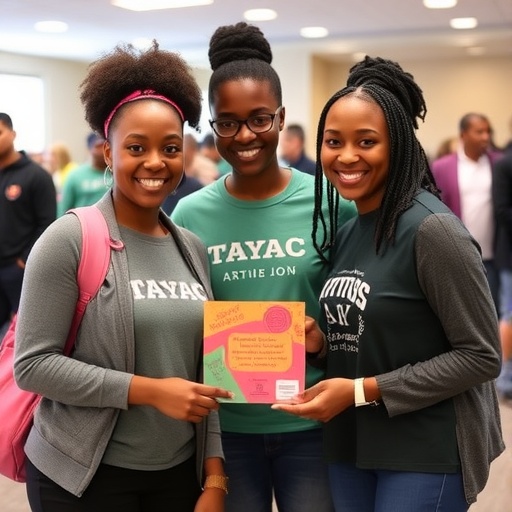In an ambitious endeavor poised to reshape public engagement with Indigenous American history, Associate Professor Gabrielle Tayac of George Mason University’s History and Art History department has secured substantial funding to propel the “INCL: Indigenous America 250 Community Engagement PHASE 2” project. This initiative emerges as a critical extension of ongoing efforts to foster powerful interpretation and educational programs that illuminate the diverse and profound narratives of Indigenous communities across the Americas, intersecting history, culture, and sovereignty in profound ways.
The project is built upon the foundational work of the Indigenous America 250 HRS, a sweeping collection of interpretative programs developed to mark a significant epoch in Indigenous history, culture, and contemporary issues. The core mission of PHASE 2 is to refine and augment educational outreach, particularly through innovative interpretive frameworks that not only convey historical facts but also honor Indigenous data sovereignty — the principle that Indigenous peoples have inherent rights to control data about their communities and histories.
Tayac’s role involves a meticulous selection of five strategically significant sites characterized by their potential for impactful educational interpretation. These locations will serve as living classrooms where history is not only taught but experienced through a confluence of heritage, technology, and participatory learning methods. The selection process emphasizes data sovereignty insights, ensuring that the narratives presented are governed by Indigenous perspectives and ethical standards.
The scholarship underpinning this project is deeply collaborative, involving an interdisciplinary approach that draws on museology, anthropology, history, and Indigenous studies. Tayac is set to orchestrate a series of expert consultations with tribal knowledge holders — custodians of profound oral histories and cultural wisdom — as well as museologists specializing in interpretative methodologies. This collaboration will take shape through an intensive on-site session dedicated to crafting a comprehensive interpretive plan, followed by iterative review sessions designed to refine and perfect the educational products.
One of the project’s groundbreaking elements lies in its co-curatorial methodology. Unlike traditional top-down historical interpretations, this approach enlists Indigenous voices not only as subjects but as active curators. The resulting interpretive products — planned to include multimedia exhibits, interactive digital platforms, and immersive educational tools — will prototype new standards for how Indigenous histories are presented in public spaces, fostering deeper empathy and understanding among diverse audiences.
The funding of $231,181 granted by the National Park Service underscores the federal commitment to supporting narratives that have historically been marginalized. By embedding Indigenous sovereignty within the interpretive process, the project aligns with broader efforts to reckon with historical injustices through educational reform and community engagement.
Operations began in August 2025, marking the start of a multi-year timeline scheduled through late December 2027. This extended period allows for careful, community-centered development and feedback cycles essential to producing educational materials that are not only accurate and insightful but also resonate on a cultural and emotional level.
The implications of this project extend beyond simple interpretation. It represents a transformative model for curatorial practice and public history education, where interpretive content is designed to be dynamic, adaptable, and deeply rooted in the living experiences of Indigenous peoples. This sets a precedent for future historical projects that seek to be both respectful and revolutionary.
Moreover, the technological integration envisaged for the interpretive products promises to leverage digital storytelling, augmented reality, and interactive exhibits. These tools enhance accessibility for wider audiences, including those unable to visit sites in person, thus democratizing access to Indigenous histories and promoting a more inclusive historical dialogue.
The project’s emphasis on ethical collaboration with Tribal knowledge holders champions a participatory governance model for heritage interpretation. This ensures that Indigenous communities retain agency over their stories and how they are disseminated, a critical evolution in the relationships between institutions like the National Park Service and Indigenous nations.
As the project moves forward, the careful balance between academic rigor and community relevance remains a defining characteristic. It reflects a growing recognition in the fields of public history and anthropology that the past must be approached not just as a record but as a living narrative interwoven with present-day identities and futures.
This initiative situates George Mason University at the forefront of socially responsible, community-engaged scholarship, reinforcing the university’s commitment to diversity, innovation, and impactful research. Tayac’s leadership in this project exemplifies how academia can meaningfully contribute to societal understanding and cultural preservation in the 21st century.
By crafting educational experiences rooted in shared authority and technological innovation, the “INCL: Indigenous America 250 Community Engagement PHASE 2” project has the potential to reshape historical consciousness both within the United States and globally. It spotlights Indigenous voices with a clarity and respect that challenges conventional historical narratives and offers a richer, more inclusive understanding of Indigenous America.
Subject of Research: Indigenous American history and culture, educational interpretation, Indigenous data sovereignty, community engagement
Article Title: George Mason University Advances Indigenous America 250 Interpretation with New Community Engagement Project
News Publication Date: Information not provided
Web References: George Mason University
References: Information not provided
Image Credits: Information not provided
Keywords: Anthropology, Indigenous history, data sovereignty, cultural interpretation, museology, public history, community engagement, interactive education




